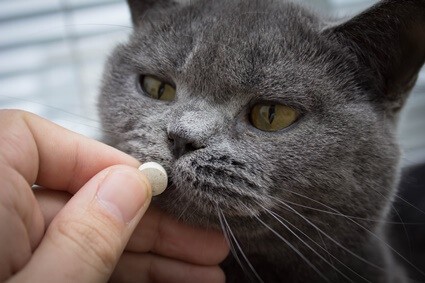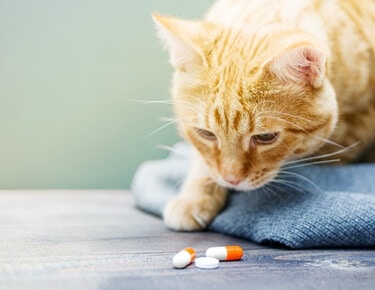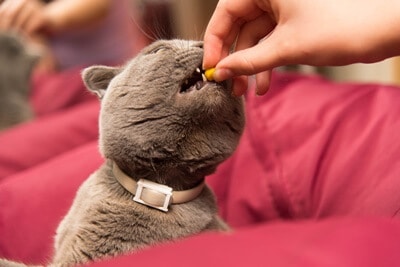A cat’s body requires a wide range of essential vitamins, minerals, and nutrients to function optimally, and these should always be found in a cat’s food.
Vitamins A, D, E, and K are fat-soluble vitamins required by cats. Felines require water-soluble vitamins from the Vitamin B family, especially Vitamin B12 (cobalamin). Also, cats need minerals, such as calcium, potassium, phosphorous, sodium chloride, and magnesium. Cats’ bodies produce Vitamin C.
Sometimes, ill-health means that a cat’s body cannot derive vitamins from food. Avoid supplements in otherwise healthy cats without consulting a veterinarian, as excess vitamins and minerals lead to sickness.
Cat Nutritional Requirements
Healthy skin, fur, and bones, alongside functional organs and a sharp mind, all come from giving a cat the right diet. Alongside protein (amino acids) and fat, vitamins and minerals are essential to feline health.
Quality protein-rich food will provide the vitamins and minerals that cats need in appropriate quantities. Supplementing this intake can be harmful as excessive vitamins and minerals can be toxic to cats.
Check the label on cat food to ensure that it has all the vitamins and minerals that a cat needs. If it doesn’t, consider switching to a different brand.
What Vitamins Do Cats Need?
Cats need 14 different vitamins to thrive, and these should all be found in your cat’s food.
If this is the case, further supplementation isn’t required. If your cat shows any signs of a vitamin deficiency, your cat may have a medical condition that prevents vitamin absorption.
Vitamin A
Vitamin A is linked to healthy skin and vision in cats. If your cat has injured itself, Vitamin A promotes self-healing. By getting enough Vitamin A, the skin will heal and regenerate.
Vitamin A is critical to good night vision, and a cat that lacks Vitamin A will struggle to see in the darkness. As cats are crepuscular and like to patrol at night, this can be risky.

Vitamin D
Vitamin D enables the body to absorb calcium, preventing a cat’s bones and teeth from becoming brittle.
Cats don’t absorb much Vitamin D from the sun’s rays, so it’s a vital component of your cat’s diet.
Vitamin E
Your cat’s immune system relies upon Vitamin E. If a cat lacks sufficient Vitamin E, it will become more susceptible to viruses and allergens.
The Journal of Nutrition notes that Vitamin E is important for cats that enjoy a fish-based diet as fish is high in polyunsaturated fatty acids, which can cause oxidation.
Vitamin K
Vitamin K helps the blood to coagulate.
Without it, a cat risks becoming anemic as the blood becomes increasingly thin. A Vitamin K deficiency has been linked to hemophilia in cats.
Vitamin B1 (Thiamine)
Vitamin B1 is one of the most vital components of cat food. Ensure that thiamine is found in your cat’s food.
Vitamin B1 metabolizes carbohydrates, which is critical for cats as the feline body struggles to process carbs.
Also, thiamine promotes brain health. Without Vitamin B1, your cat’s brain will struggle to send messages to the nervous system.
Vitamin B2 (Riboflavin)
While primarily found in dairy, which is cat-unfriendly as cats are lactose intolerant, felines need riboflavin. Vitamin B2 promotes healthy fur growth in cats. Without this Vitamin B2, your cat is more likely to get alopecia.
Vitamin B3 (Niacin)
Vitamin B3 is beneficial for the skin and fur, ensuring that the cat’s skin is healthy and its coat remains glossy. Also, Vitamin B3 breaks down sugar and fat, turning them into energy.
Higher levels of Vitamin B3 in the diet will reduce the risk of obesity.
Vitamin B4 (Choline)
Vitamin B4, alongside Vitamin B8, maintains healthy skin in cats. These vitamins hydrate the skin.
The Journal of Small Animal Practice connects Vitamin B4 to brain function. For example, a choline deficiency has been linked to feline cognitive dysfunction.
Vitamin B4 can reduce the risk of seizures in epileptic cats.
Vitamin B5 (Pantothenic Acid)
Pantothenic acids take their name from the Greek word, “pantos.” This loosely translates into English as “found everywhere.” The reason for this is that Vitamin B5 can overwhelm your cat’s body.
Vitamin B5 helps convert food into an energy source and breaks down fats.
Vitamin B6 (Pyridoxine)
Vitamin B6 serves the same purpose as Vitamin B5. It’s another coenzyme that keeps your cat’s metabolism healthy.
Vitamin B7 (Biotin)
The impact of Vitamin B7 is almost identical to that of Vitamin B3.
Biotin will improve your cat’s fur/skin and break down glucose, and this means that your cat will be more energetic and maintain a healthy blood sugar level.
Vitamin B8 (Inositol)
Inositol works alongside Vitamin B4 to ensure that your cat’s skin is healthy. This vitamin strengthens the cell membranes, turning your cat’s skin into a protective shield.
Vitamin B9 (Folic Acid)
According to The American Journal of Veterinary Research, folic acid creates red blood cells, which are essential for distributing oxygen around the body.
Folic acid is also essential for pregnant cats as the fetuses growing inside a female cat thrive on Vitamin B9. This means that a pregnant cat should have more folic acid than she ordinarily would.
Vitamin B12 (Cobalamin)
The main role of Vitamin B12 is encouraging a healthy gut and digestive tract. If your cat has sufficient levels of cobalamin, it will process food naturally and efficiently.
Cats don’t generate B12 organically, so it must be consumed through food. A Vitamin B12 deficiency can lead to sudden weight loss and a lack of energy.
Essential Minerals for Cats
Vitamins and minerals are both micronutrients, but there’s a key difference between them.
Vitamins are organic structures that break down inside a cat’s body once absorbed by fat or water. Minerals are inorganic, holding their structure when consumed.
Minerals are easier for cats to obtain and are only needed in trace quantities.
Calcium
Kittens need calcium to develop healthy teeth and bones, but it’s just as important as cats’ age. Calcium is also an electrolyte that maintains healthy kidney function in adult cats.
Never offer cats milk to increase their calcium intake. Aside from the fact that most cats are lactose intolerant, excess calcium causes hypercalcemia.
According to the Journal of Veterinary Internal Medicine, hypercalcemia can lead to abnormal tissue growth (neoplasia), urinary tract infections, and renal failure.
Phosphorus
Phosphorous plays a role in the formation of teeth and bones, and it also affects how the body converts energy.
Potassium
Potassium is critical for feline nutrition, especially once cats grow older. Low levels of potassium in the blood cause a range of issues.
As cats age, potassium levels naturally start to fall, resulting in lethargy, depression, and dull fur. This is why specialist food for older cats is essential.
Senior cat food is high in potassium, replacing less essential minerals.
Sodium Chloride
Most cat foods contain an appropriate amount of sodium chloride. As this is essentially table salt, it’ll encourage your cat to drink water.
After drinking, the cat will need to urinate. This will clear waste from the kidneys and prevent the formation of bladder stones. In moderation, this makes sodium a key mineral.
Magnesium
Magnesium transports critical hormones and enzymes throughout a cat’s organs and nerves.
As the Canadian Journal of Veterinary Research explains, a magnesium deficiency can lead to feline cardiomyopathy. Muscle twitches and uncoordinated movements are also symptoms.
Zinc
The primary function of zinc is to promote good-quality skin and fur.
Zinc is also key to the reproductive function of female cats.
Iron
Iron amplifies oxygen levels in the body. This means that blood pumps around the cat’s body, ensuring the maximum performance of muscles and internal organs. Iron is only required in trace amounts.

Manganese
Manganese strengthens and solidifies bones and cartilage. According to The Journal of Inflammation, manganese may provide relief for an arthritic cat.
The meat in your cat’s food will only contain tiny traces of this mineral. It’s more commonly found in grains.
Copper
The influence of copper in a cat’s diet is felt in the fur and the blood. Copper helps the body to metabolize iron, preventing a cat from becoming anemic. Copper also synthesizes melanin.
This is the hormone that gives a cat’s fur its color. If a cat’s body lacks copper, its coat will become dull and lifeless. It could even change the shade if a copper deficiency is prolonged.
Iodine
Iodine only needs to be consumed in trace amounts.
Up to 80% of a cat’s iodine consumption makes its way to the thyroid gland. This stimulates the gland, encouraging a healthy release of triiodothyronine (T3) and thyroxine (T4).
An iodine deficiency can lead to hypothyroidism, which is a below-standard release of these hormones.
Selenium
Selenium is linked to a cat’s thyroid gland, so a deficiency could lead to hypothyroidism. As The Journal of Toxicology and Environmental Health explains, selenium is valuable if your cat enjoys tuna fish.
Tuna is a tasty treat for cats, but it can cause mercury poisoning, but selenium can inhibit the absorption of mercury.


Hello, My Name is Lisa
There is a cat that was left abandoned on our property.
Upon taking him to the vet he looked so bad he was diagnosed with feline leukemia. And there is no cure, she wanted to put him down immediately, we asked to wait to see if he could come around.
He has but he keeps an upper respiratory infection. I have been reading and it says they can live. With symptoms dying down but will always have it. What vitamins can I give to help the mucous.
Hi Lisa…I hope this reply can still help the kitty you’ve rescued. Turmeric, rosemary or Decaffeinated green tea can help the kitty with respiratory issues and inflammation which is the root cause. Praying you’ve been able to help the kitty already though.